| Srl | Item |
| 1 |
ID:
128739


|
|
|
|
|
| Publication |
2014.
|
| Summary/Abstract |
In this article I view Asian alliances as a product of universal security needs and culturally constructed variables. While the alliance remains one of the fundamentals of contemporary international politics, I attempt to show through comparative analysis of the Sino-Soviet alliance and the Japan-US security alliance how subtle differences of national developmental experience can significantly affect political outcomes in East Asia.
|
|
|
|
|
|
|
|
|
|
|
|
|
|
|
|
| 2 |
ID:
128746
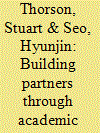

|
|
|
|
|
| Publication |
2014.
|
| Summary/Abstract |
Science can serve as an attractive mode for trust building and cooperative engagement between countries where formal political or diplomatic relations have been strained or are nonexistent. In this article we discuss some conditions and constraints for bilateral academic science engagement and suggest how such engagement might help to build trust between the United States and North Korea. We analyze longitudinal data on North Korea's diplomatic ties and international academic collaboration as well as US public opinion data to provide context for US-North Korea science engagement. We argue that bilateral academic science engagement should be attractive to the United States and North Korea and suggest a set of policy measures that might facilitate such engagement.
|
|
|
|
|
|
|
|
|
|
|
|
|
|
|
|
| 3 |
ID:
128749
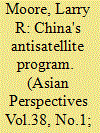

|
|
|
|
|
| Publication |
2014.
|
| Summary/Abstract |
I analyze the substance and goals of China's antisatellite program. Following China's 2007 antisatellite test that successfully destroyed one of its aging satellites, signs have emerged that China is continuing to research ways to exploit the heavy US reliance on space. This capability is most likely being developed as an "assassin's mace" to gain an advantage against a technologically superior enemy in the event of conflict. I propose a number of countermeasures to negate the threat to US space security
|
|
|
|
|
|
|
|
|
|
|
|
|
|
|
|
| 4 |
ID:
128743
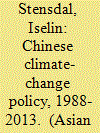

|
|
|
|
|
| Publication |
2014.
|
| Summary/Abstract |
China's domestic climate-change policy has changed remarkably since 1988. In the late 1980s, the central government viewed climate change as a highly scientific, foreign affairs issue, and any policies were limited to scientific investigations. A mere decade later, climate change was seen as a developmental issue. By 2007 climate change had become a national priority. Since then, climate-change policies have expanded in measure and in scope. In this article I employ the advocacy coalition framework (ACF) to explain the policy changes. The ACF takes into account the overall sophistication of socioeconomic conditions in China as well as the climate-change advocacy coalition's communications and active use of their amassed knowledge to influence policy.
|
|
|
|
|
|
|
|
|
|
|
|
|
|
|
|
| 5 |
ID:
128742
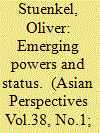

|
|
|
|
|
| Publication |
2014.
|
| Summary/Abstract |
Why did the leaders of four very different countries-Brazil, Russia, India, and China-decide to hold a summit in 2009 in Yekaterinburg, thus transforming "the BRICs" from a financial category into a political grouping? I argue that the main driver for the first summit to take place and succeed was to strengthen each member country's international status. The 2009 BRICs summit was successful in that it led to the birth of a political platform during highly unusual international economic and political circumstances. In a global economy in the midst of a recession and widespread uncertainty, the BRICs' relative economic stability and capacity to respond to the crisis was decisive and lent credibility to their call for reform of the international system. The United States' temporarily reduced legitimacy also provided a window of opportunity for emerging powers to act as aspiring guarantors of stability in tomorrow's world. While measureable gains from cooperation and stronger rhetoric that delegitimized the global order did occur in the following years, they were not the primary drivers for the first summit to take place and succeed.
|
|
|
|
|
|
|
|
|
|
|
|
|
|
|
|
| 6 |
ID:
128740


|
|
|
|
|
| Publication |
2014.
|
| Summary/Abstract |
Despite highly favorable conditions for cooperation, South Korea and Japan have experienced almost constant diplomatic conflict since the end of the Cold War, in large part because of unresolved history disputes. Through the theoretical approach of symbolic politics, I examine the substance of these conflicts and the processes by which specific group identities affect policymaking in and the relationship between the two countries. Based on three case studies I suggest that diplomatic conflicts are the result of identity clashes between a group of Japanese conservative elites and the South Korean public, manifested through the elite-led process of symbolic politics in Japan and the mass-led process in South Korea. These findings help analysts understand the patterns that these conflicts exhibit and assess the prospects for future reconciliation between South Korea and Japan.
|
|
|
|
|
|
|
|
|
|
|
|
|
|
|
|
| 7 |
ID:
128741
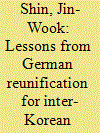

|
|
|
|
|
| Publication |
2014.
|
| Summary/Abstract |
In this article I present competing patterns of discursive reconstruction of German reunification in South Korean public spheres and the methods of mobilizing them for domestic debates on inter-Korean relations. I analyze the editorials and opinion articles of two newspapers, Chosun Daily and Hankyoreh, which respectively represent the most influential conservative and progressive print media in South Korea. The articles not only discuss German reunification in contrasting ways but also integrate those interpretive schemes into policy advocacy on North Korea. The conservatives utilized the narratives about the breakdown of the East German regime and the subsequent unification to justify an aggressive policy toward North Korea, whereas progressives consistently judged the German case as "unification by absorption," giving full support to reconciliation and peaceful coexistence.
|
|
|
|
|
|
|
|
|
|
|
|
|
|
|
|